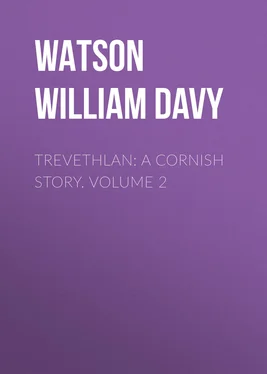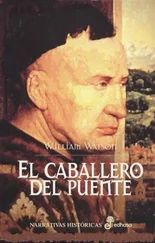William Watson - Trevethlan - A Cornish Story. Volume 2
Здесь есть возможность читать онлайн «William Watson - Trevethlan - A Cornish Story. Volume 2» — ознакомительный отрывок электронной книги совершенно бесплатно, а после прочтения отрывка купить полную версию. В некоторых случаях можно слушать аудио, скачать через торрент в формате fb2 и присутствует краткое содержание. Жанр: foreign_prose, foreign_antique, на английском языке. Описание произведения, (предисловие) а так же отзывы посетителей доступны на портале библиотеки ЛибКат.
- Название:Trevethlan: A Cornish Story. Volume 2
- Автор:
- Жанр:
- Год:неизвестен
- ISBN:нет данных
- Рейтинг книги:3 / 5. Голосов: 1
-
Избранное:Добавить в избранное
- Отзывы:
-
Ваша оценка:
- 60
- 1
- 2
- 3
- 4
- 5
Trevethlan: A Cornish Story. Volume 2: краткое содержание, описание и аннотация
Предлагаем к чтению аннотацию, описание, краткое содержание или предисловие (зависит от того, что написал сам автор книги «Trevethlan: A Cornish Story. Volume 2»). Если вы не нашли необходимую информацию о книге — напишите в комментариях, мы постараемся отыскать её.
Trevethlan: A Cornish Story. Volume 2 — читать онлайн ознакомительный отрывок
Ниже представлен текст книги, разбитый по страницам. Система сохранения места последней прочитанной страницы, позволяет с удобством читать онлайн бесплатно книгу «Trevethlan: A Cornish Story. Volume 2», без необходимости каждый раз заново искать на чём Вы остановились. Поставьте закладку, и сможете в любой момент перейти на страницу, на которой закончили чтение.
Интервал:
Закладка:
The other habitations surrounding the green were of various sizes, some with small gardens in front, some neat, and some neglected,—almost all thatched and whitewashed. A sleepy, listless air hung about the place. A stranger wandering accidentally into it, would feel at once that it had known better days; the children might seem to play with less liveliness than usual, and the very geese to waddle over the grass with a lazy gait. He would fancy the gossips at the cottage doors to be inanimate in their chat, and might himself be yielding to a sense of drowsiness, when the sight of Dame Miniver, in her neat brown silk gown, and snow-white apron, looking complacently at the visitor, with an inviting smile that was irresistible, would recall his fleeting spirits, and guide his steps to the friendly shelter of the Trevethlan Arms.
The late owner of the castle, it has already been said, was extremely unpopular with his tenantry, for some time both before and after his marriage. Proud themselves of the family upon which they had depended beyond the memory of man, they hated to see it stripped, acre by acre, of its broad lands, and so impoverished as to be unable to afford them the old advantages. Remembering the current prophecy, they loathed a match which seemed to harbinger its fulfilment, and at the same time rendered it next to impossible for Pendarrel to come to Trevethlan, although the reverse might happen on several contingencies. But after the death of poor Margaret, and when an infant son and daughter stood in the way of any such consummation, and their lord came often among them, haughty indeed, but not unkind; poor, but still generous; and they could not avoid seeing the melancholy written in his face, and recollected his reported courtship, years before, of Esther Pendarrel, and thought of the kinsman who had sold his name; their animosity gradually melted into compassion, and a deep and sullen hatred grew up among them against the house of Pendarrel and everything connected with it.
The discontent now pervading the country had not spared Trevethlan. It was true, that if the sentiment—war to the mansions—were diffused at all in the village, it had no reference to the castle. There was not a man on the estate but was ready to die in defence of the towers on the cliff. But other feelings might be entertained towards some of their neighbours. Hitherto they had exhausted their animosity in conflicts arising at wrestling-matches and country fairs, but now there were symptoms discoverable of more dangerous hostilities.
And the movement was encouraged by the absence of the young master. The villagers regretted, without blaming, a departure which was intended, they hoped, in some way or other, to restore prosperity to the family. But it removed a check which might have soothed their exasperation. And in like manner the return of the orphans would probably turn aside any ideas of immediate violence, if such had really gained any footing in the hamlet.
On the evening of their arrival, some of the notables met to discuss things in general, around the fire in Dame Miniver's hall. There were farmer Colan, and Germoe the tailor of the hamlet, and Breage whose wife kept the shop where everything was sold, and, among divers others, Edward Owen, Sinson's unsuccessful rival for the affections of pretty Mercy Page. Owen, formerly one of the best-conducted men in the hamlet, was now sulky and perverse, and Mercy had obtained no slight odium by her too great fidelity to one who was regarded as a deserter. She little thought her old lover had been lately in the neighbourhood, and she was even now meditating an excursion to inquire after him, in one of those mysterious modes, which were yet resorted to occasionally by the lovers of the far-west.
"A health to our squire!" cried Colan, filling a cup of cyder, "and to our bonny young lady, and welcome back to Trevethlan."
"Faith," said Owen, "they're not come back to do much good to Trevethlan, I reckon. There's none of the fortune come with 'em as folks used to talk about, or they'd never ha' gone through the town with a rubbishy old chay from Helston."
"Small blame to Squire Randolph," observed Germoe, "that he don't throw away the little he's left, like our poor master before him. And, for my part, I'd rather have him among us, poor though he may be, than away nobody knows where.
'The place is bare, when the lord's not there.'
There'll be more smiles in Trevethlan than there's been this many a day."
"Then there's not much to smile about," Owen replied; "and the best maybe the squire could do, were to take back some of that's been stolen from him. There's many a lad ready to strike a blow for Trevethlan."
"Wild talk, Edward," said Breage; "wild talk, and nothing but it. We live by the law now-a-days."
"And there's a pleasanter way," observed Dame Miniver. "Miss Mildred of Pendar'l 's as pretty a lady as ever stepped, and she might bring the squire all his land again, and fulfil the saying quite agreeable,
'Pendar'l and Trevethlan will own one name.'"
"There's too much ill blood atween the houses," Colan said. "A deal too much. Didn't the lady of Pendar'l turn the late squire away? And didn't our young master send her back from his gate with a flea in her ear? Don't ye recollect how Jeffrey chuckled about it? The young folks have ne'er seen one another, Mrs. Miniver."
"How d'ye know?" the hostess asked. "And trust me, if meet they did, there'd meet a couple predestinated to fall in love. In all the old tales that ever I read, the true gentleman falls in love with the wrong lady. But, of course, they must meet, or they haven't the chance, and somehow they always do meet."
"Well," said Germoe, "I'll wager the day ne'er dawns that sees that match. The saying'll not hold good in our time—mark my words."
"There's a deal of wisdom in those old sayings," quoth Mistress Miniver. "Ay, and in others too. Mind ye not how old Maud Basset foretold a fortune for her child, and the gipsy crossed it, and both came out as true as gospel? Those sayings are not to be looked down upon, Master Germoe."
"If ever that saying comes true in my time," muttered Owen, "and not on our side, there'll be a tale told of Pendar'l—that's all I know."
But the remark excited no attention, and from such predictions the company slid by degrees into the kindred and fascinating subject of preternatural visitations, a wide field in that remote district of the west; and they drew their seats closer round the fire, and dropped their voices, until they almost frightened one another into a reluctance to separate on their different ways homeward.
They would, perhaps, have expressed themselves in a more discontented manner, if they had known the intention with which Randolph sought the home of his fathers: he has himself obscurely intimated it, in his soliloquy by the sea. To persuade his sister to remain in those old halls, under the guardianship of Polydore Riches; to return himself to London, to obtain, in spite of all obstacles, an interview with Mildred Pendarrel; to extract from her the confession which he was convinced she was ready to make; to exchange mutual vows; to look round the world for the path which he might cut to honour and fortune; to return and claim his bride, who by that time would be her own mistress—such was the scheme upon which he was at present resolved. It was a wild outline, and he did not trouble himself to fill up the details. Young and ardent, he looked straight to the summit of his ambition, and recked nothing of the ravines which separated the various intervening ridges.
But with all his determination he hesitated to disclose his idea to Helen. He felt that to her he was everything. Until quite recently they had always shared one another's thoughts. He trembled at the anguish he should inflict by such a separation. And so he deferred the confidence from time to time, persuading himself that it would best be made on the very eve of his departure, until this was indefinitely postponed by intelligence that Pendarrel Hall was being prepared for the immediate reception of its mistress.
Читать дальшеИнтервал:
Закладка:
Похожие книги на «Trevethlan: A Cornish Story. Volume 2»
Представляем Вашему вниманию похожие книги на «Trevethlan: A Cornish Story. Volume 2» списком для выбора. Мы отобрали схожую по названию и смыслу литературу в надежде предоставить читателям больше вариантов отыскать новые, интересные, ещё непрочитанные произведения.
Обсуждение, отзывы о книге «Trevethlan: A Cornish Story. Volume 2» и просто собственные мнения читателей. Оставьте ваши комментарии, напишите, что Вы думаете о произведении, его смысле или главных героях. Укажите что конкретно понравилось, а что нет, и почему Вы так считаете.












